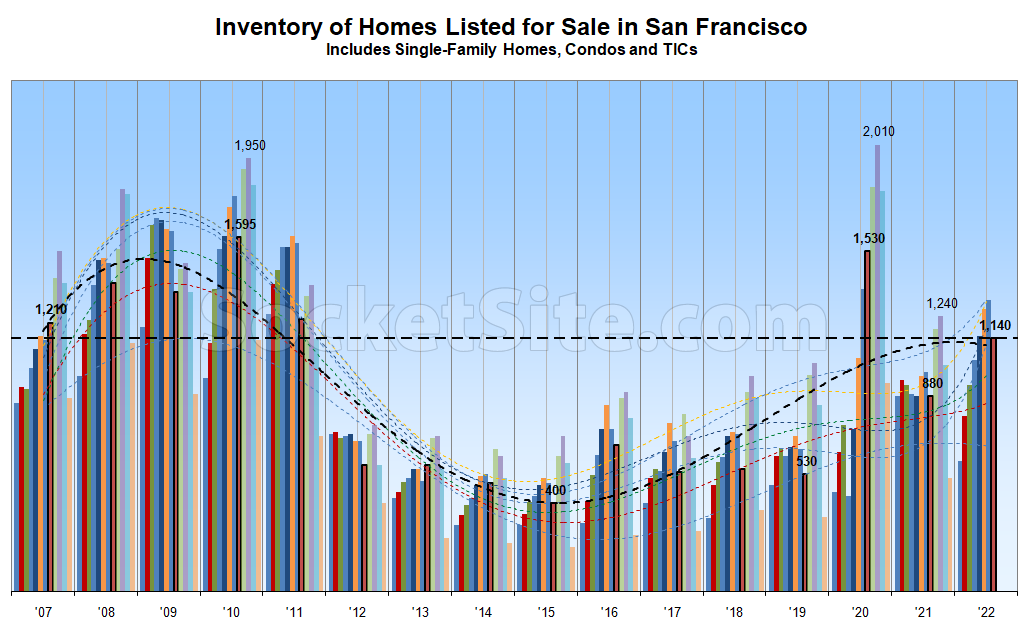Having hit a seasonal peak last month, which shouldn’t have caught any plugged-in readers by surprise, the net number of homes on the market in San Francisco (i.e., inventory) has since dropped a little over 10 percent to 1,140, including a one (1) percent drop over the past week.
That being said, inventory levels in San Francisco are still 30 percent higher than at the same time last year, 50 percent higher than average over the past decade, 115 percent higher than prior to the pandemic and 180 percent higher than in August of 2015, with the percentage of homes on the market in San Francisco for which the asking price has been reduced currently hovering around 30 percent and the number of homes in contract now down 39 percent on a year-over-year basis and dropping.
As we outlined last month, expect inventory levels in San Francisco to continue to drop through the end of August before jumping again in September, hitting a peak in October and then trailing off through the end of the year but with an increase in price reductions. We’ll keep you posted and plugged-in.

is it possible to break this out by property type and district?
Doesn’t seem like a lot of homes given the population size.
Of course not! If you restrict the supply the value only goes up. None of the wealthy elite owners want more supply which their properties would lose value. California has a major conflict between affordable housing (YIMBY’s) and “environmental issues” (NIMBY’s). Instead of building more homes to increase the supply, politicians have implemented price controls to help a select few but it only exacerbates the problem. There’s been a push to build multiple-story apartment complexes in less desirable areas like SOMA and Hunters Point but the physical land is seeking (use to be either creek-bed or actual bay) or contaminated with waste. Also, building regulations make cost to build more expensive for investors than elsewhere. Yeah, there’s a bunch of issues with the lack of homes in SF and it’s mainly because those that already have a home there (local voters) don’t want more to be built.
You probably know all of this but I felt the need to get it all out
There are approx 40,000 currently-vacant units in SF (~10% of total units), due to speculation, money laundering, foreign capital flight, tax shelters, etc. Impose a vacancy tax, and watch supply boom, like magic! Much easier and quicker than building another 40,000 units, many of which would be left vacant if vacancy isn’t disincentivized for the land pirate gang.
You probably know all this..
There Are Not 40,000 Vacant Homes in San Francisco.
You left out “onerous rent regulations” and “lifetime leases”. They factor in as well.
No one is forcing you to buy and hold property. You knew all these conditions before you bought. Most SF property owners are doing
quiteextremely well. If owning real estate in San Francisco and collecting the obscene rents therein is so traumatic for you that you are compelled to leave your units vacant, please consider another source of income and/or wealth storage.Arguing that SF LLs have no choice but leave their properties vacant owing to “onerous rent regulations” and “lifetime leases”, is like the glutton who damns the ten pizzas he gorged on for his upset stomach.
two beers – I have owned my 2 flat building for several decades. There is no way I could have predicted the regulations that have been implemented during my ownership term. The rules have changed. I won’t give up my home in the City just to provide a single unit for rent.
Real estate is where most American’s wealth is stored. Affordable housing is never going to happen. The established “boomers” have already taken everything for themselves, rest of us be damned.
San Francisco has limited land to build on. It’s only 7x7miles. It’s full so of course the value will go up. As far as empty properties, owners are terrified of bad tenants they can’t evict. Drug addicts, felons, even pedophiles have tenents rights damaging and terrorizing their owners. Too many protections have created worse problems. States without all these laws manage their population much better with in-law units, add ons, evicting bad tenents and keeping good ones. Ability to evict bad Tenents means more opening units for rent. Many Tenents in rent control, actually own houses they rent out! SF liberals including myself, created this problem.
Then why don’t they get out of the landlord business and move on to something else if they don’t like it? Free market FTW
Exactly. You know what? In the U.S., thirty-six states prohibit rent control entirely. Why don’t the penny-ante landlords all decamp to those states “without all these [tenents rights] laws” and set up shop there?